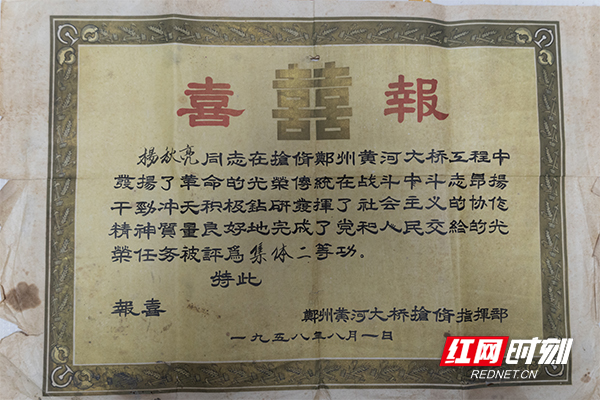Yang Qiuliang, a returned overseas Chinese in his 90s A testimonial of Yang Born in Singapore in 1933, Yang Qiuliang is a native of Raoping, Chaozhou, Guangdong Province. "My hometown, Raoping, has long had the custom of making a living in Nanyang. Therefore, most of the elders in my family are working abroad. My father is in Singapore, my uncle is in Thailand, and my grandfather used to make a living in Nanyang when he was young." "My grandfather often wrote letters to us. On the one hand, he hoped that we could come back to China for further development."Yang Qiuliang's memory is vivid. At the age of 4, Yang Qiuliang returned to his hometown with his father.The vulgar tastes of his hometown satisfied Yang Qiuliang's memories and bounds of his hometown. "After a brief reunion, my father wanted to take me back to Singapore again, but he couldn't persuade me, and I stayed with him during the Anti-Japanese War."Yang Qiuliang said. Raoping was a famous red Soviet area in eastern Guangdong at that time. Zhu De had fought in Raoping, and the people who stayed in his hometown had a certain revolutionary foundation.It was in Raoping that Yang Qiuliang joined the revolution. At the age of 15, Yang Qiuliang took the initiative to join the army and participated in the liberation of Raoping and other places. He was a traffic officer in the fourth detachment of Dongjiang Column Guangdong Guerrilla Corps and participated in underground liaison work. "Traffic officers mainly do underground intelligence and liaison work, and often have to run to enemy-occupied areas.If you can't come back, it's over."Yang still feels a chill in his back after recalling his near-death experience in the army early in his life. "I was surrounded by enemy soldiers during an intelligence investigation. I was surrounded in a village with the enemy lurking on all sides.As I ran, the enemy chased me while I ran. The sound of bullets flashed by my ears from time to time. Fortunately, with great luck, I managed to get out of the encirclment and get out of the village along the river, delivering the information safely. "Build Bridges all one's life, live in barracks all one's life, be a cowherd all one's life."This is a catchphrase used to describe people who build Bridges, and it is also a portrayal of Yang Qiuliang's life. Recalling the construction, Yang Qiuliang sighed: "It was a passionate bridge building era. It was glorious for many people to move even one brick for the bridge."At that time, people took the initiative to work overtime, take the initiative to work, very high enthusiasm, all want to contribute to the construction of socialism. In 1956, after his retirement, Yang Qiuliang was arranged to be stationed in Wuhan Bridge Bureau, and the bridge dealt with.With his team stationed everywhere, from Inner Mongolia to the northeast to the lower reaches of the Yangtze River, Yang jokingly calls himself "the bridge man." Yang Qiuliang said while taking out the collection of years of "good news" and celebrating the 60th and 70th anniversary of the founding of the People's Republic of China commemorative MEDALS.He said, "This certificate was awarded by Zhengzhou Yellow River Bridge Emergency Repair Headquarters on August 1, 1958. He and his colleagues were awarded the second class merit for their excellent performance in the repair of the bridge. In July 1958, due to the continuous rainstorm, the Yellow River had a huge flood rarely seen in history, which washed down the piers of the Yellow River Railway Bridge in Zhengzhou, causing serious deviation of the bridge. At that time, the goods and materials of New China were transported from north to south through this railway bridge. Once the railway bridge across the Yellow River was washed away by a flood, the north-south traffic would be paralyzed, which seriously affected the economic development of New China and the transportation of ordinary people. If not dealt with in time, the consequences would have been unthinkable.The plan, presented to the State Council by the Zhengzhou newspaper, was to organize and use more than 10,000 troops and people to pull the bridge piers back into position with towing ropes. "When more than 10,000 of us were pulling the tow, Premier Zhou Enlai appeared in the rain to cheer us on."Yang Qiuliang clearly remembered that the appearance of Premier Zhou let the scene including him, the towing officers and men and the public enthusiasm."I can't remember how many sleepless nights it was. When I was tired, I would have a rest anywhere and then continue to work. After a month of hard work, the bridge foundation was repaired successfully." Yang said that during his "bridge-building" journey, he also participated in the construction of railway Bridges in many places, including Wuhan Yangtze River Bridge, Nanjing Bridge, Juzizhou Bridge and Houzishi Bridge. Speaking of the construction of Changsha Hizishi Bridge, it is also an opportunity for him to fall in love with Changsha and live here. In 1960, Yang Qiuliang followed his unit to Changsha to build the Hizishi Bridge.Because of the fund, has been in the state of repair and repair, the unit will be resident in Changsha.In his spare time, Yang Qiuliang and his colleagues often like to go to the downtown for fun and make friends with many overseas Chinese.Attracted by the policies of Changsha, I stayed in Changsha and gradually fell in love with this land and its people. Today, Yang and his wife often take a walk near the Houzishi Bridge to enjoy the bustling city of Changsha and witness the prosperity of the motherland.

A Ninety-years old returned overseas Chinese's pure heart
Editor:聂伊岑
Source:Enlish.rednet.cn
Updated:2021-07-15 11:01:56
Source:Enlish.rednet.cn
Updated:2021-07-15 11:01:56
Special
Contact
Welcome to English Channel! Any suggestion, welcome.Tel:0731-82965627
lisl@rednet.cn
zhouqian@rednet.cn











